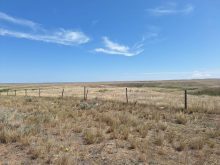Old, used grain bags are big, bulky and present a disposal headache for farmers.
But for Rodney Sidloski, the CEO of Weyburn, Saskatchewan-based HELP International, they are a potential gold mine.
“We can potentially see a retail value of up to $4,000 out of a bag that brand new only cost the farmer about $1,000,” said Sidloski. “Imagine that, from a recycled product.”
With the help of a handful of interns from foreign universities who assist a number of agroforestry-related projects at his eight-acre site, Sidloski has developed a streamlined process for turning the bags into long-lasting mulch pads that can prevent weeds and grasses from choking out newly planted tree seedlings.
Read Also

Farming Smarter receives financial boost from Alberta government for potato research
Farming Smarter near Lethbridge got a boost to its research equipment, thanks to the Alberta government’s increase in funding for research associations.
In the past six weeks, he and his team have repurposed about 20 bags by cutting them into two-foot squares with an x-shaped slit in the middle for the tree to grow up through. Because they are made from such high-quality, heavy plastic, the pads make newly planted trees virtually maintenance free for up to 20 years, he said.
In researching the idea, he has even found that at $2 each, the plastic squares compete favourably with a similar product made from shredded rubber tires that cost about $18 each, and much more in terms of effort and energy to recycle.
“You can make 2,000 pads from one single grain bag that are of much higher quality,” he said, adding that he is exploring a Canadian and United States patent for the idea and has arranged marketing and distribution across the Prairies through an undisclosed retail chain this spring.
The mulch pads will be marketed to appeal to urban landscapers and gardeners planting single trees, but not farm shelterbelts. They also work well for transplanted garden crops such as tomatoes, he added.
“We think the government could be a bit more visionary in protecting the environment and promoting industry, rather than spending money to send valuable products out of the province to be recycled in a really environmentally unfriendly way,” said Sidloski.
Resembling a beached whale when full of grain, grain bags weigh nearly 182 kg empty and are made of a high-quality polyethylene plastic.
At 10 mm in thickness, they are twice as thick as regular construction vapour barrier, and almost as heavy-duty as pond liner.
Slit open, they are about 10 metres wide and up to 107 metres long, and contain an average of 2,700 square metres of very useful material that has “101 uses,” said Sidloski.
“It’s unbelievable, really. There are all kinds of industries that require plastic membranes. It doesn’t have to be sent out to Alberta and melted down,” said Sidloski.
— Daniel Winters is a reporter for the Manitoba Co-operator at Oak Lake, Man.














